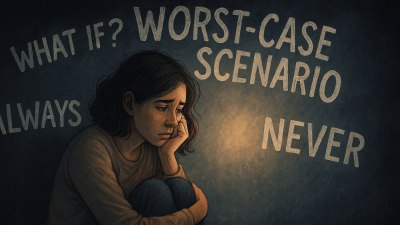Lessons from a Control Freak: How I’m Overcoming the Need to Control Everything
It’s not easy being one, nor is it easy dealing with one

This image was created with the assistance of DALL·E
We’ve all heard the term “control freak.” For many, it’s just a personality trait—nothing unusual, nothing serious. But as someone who has been a control freak for as long as I can remember, let me tell you: it’s not easy being one, nor is it easy dealing with one.
The desire to have control over our lives is completely natural and even necessary. It becomes a problem, however, when this need turns obsessive, interfering with our ability to rest, maintain a healthy balance, and truly enjoy life. Recent research in psychology and neuroscience suggests that the excessive need for control is closely linked to our brain's response to uncertainty. Studies indicate that individuals with high control needs often exhibit increased activity in the brain region responsible for planning and decision-making, as well as heightened stress responses in the amygdala when faced with unpredictability. Researchers have explored how cognitive behavioral therapy (CBT) and mindfulness techniques can help you reframe your thoughts and reduce the distress associated with a lack of control. While progress is being made, experts agree that managing control-related anxiety is an ongoing process that requires self-awareness and intentional practice.
I won’t lie—I still haven’t completely overcome my need for control. But I’ve made significant progress. Today, I’m sharing what has helped me along the way and what hasn’t. I hope some of these techniques will resonate with you, whether you’re struggling with control yourself or have a loved one who is.
How It Feels to Be a Control Freak
Being a control freak isn’t just about wanting things done a certain way. It’s deeper than that. It’s about an internal pressure that never seems to go away. It’s about feeling responsible for everything and everyone, often to an overwhelming degree. And while it may come from a place of care, it can also push people away.
- I have a constant urge to do things myself, believing it’s the only way they’ll be done "right."
- I take on responsibility for things I don’t even need to be responsible for.
- I feel an obsessive need to fix every problem—for myself and for others.
- I tend to interfere in the lives of the people I love, always with good intentions, but often pushing them away.
- I struggle to accept compliments, gifts, or help. If someone does me a favor, I feel indebted to them, even if they’re family or close friends.
What I’ve Tried: What Worked and What Didn’t
Overcoming the need for control doesn’t happen overnight. It takes daily effort. Some days, you’ll make progress; other days, you’ll fall back into old habits and regret it. But every single step counts.
- Identifying the Root Cause – Many experts say it’s crucial to understand where your need for control comes from. Maybe it’s childhood experiences, past trauma, or a learned habit. I won’t lie—I still haven’t figured out my own root cause, so if you struggle with this too, you’re not alone.
- Admitting It – Say it out loud. Own it. Apologize to your loved ones if you’ve suffocated them with your controlling tendencies—because, trust me, you probably have.
- Becoming Aware in the Moment – The most important step is recognizing when you’re doing it. Pause and tell yourself, “This is one of those moments.” Awareness is key.
- Asking for External Help – If you have a trusted person who’s patient and willing, ask them to gently point it out when you’re trying to control something unnecessarily. But make sure they’re offering support, not just criticism.
- Changing Self-Talk – When I feel anxious about losing control, I try to shift my internal dialogue. It’s not easy, but it makes a difference. Practicing self-compassion has also been huge—I remind myself that nobody is perfect and that small steps count.
- Pausing More Often – Some people recommend pausing before responding, deciding, or acting. This hasn’t worked great for me yet, but I believe it’s worth practicing more.
- Trusting That the Universe Has My Back – This mindset shift has helped me tremendously. Letting go of small things first was a great way to ease into this.
- Accepting That Different Doesn’t Mean Wrong – Just because my way works doesn’t mean it’s the only way. This realization has helped me loosen my grip.
- Delegating – Letting others take on small tasks was a huge step for me. It’s uncomfortable at first, but it’s necessary.
- Prioritizing Rest – Real rest—not just collapsing from exhaustion—is crucial. Whether it’s taking a walk, watching TV, reading, or running in the park, making space for downtime is essential.
What I’ve Learned Along the Way
This journey hasn’t been easy, and I know I still have a long way to go. But here are the biggest lessons I’ve learned so far:
- Accept compliments, gifts, and help. It doesn’t make you weak—it makes you human.
- Let people make their own mistakes. Their choices are not your responsibility.
- You can’t fix everything—and you don’t have to.
- When you stop trying to control everything, you actually gain more time.
- Peace comes when you let go. The more you release, the lighter you feel.
- Focus only on what you can control. You can’t control events, people, or even yourself all the time. The only thing truly within your control is your thoughts—and those thoughts shape your emotions and actions.
I really hope that some of these techniques and lessons may help you on your journey to freedom. Keep in mind that this article is based on personal experiences and general knowledge. It is not intended as a substitute for professional medical or psychological advice. If you are struggling with anxiety or control-related distress, seeking guidance from a licensed therapist or mental health professional is strongly recommended.





